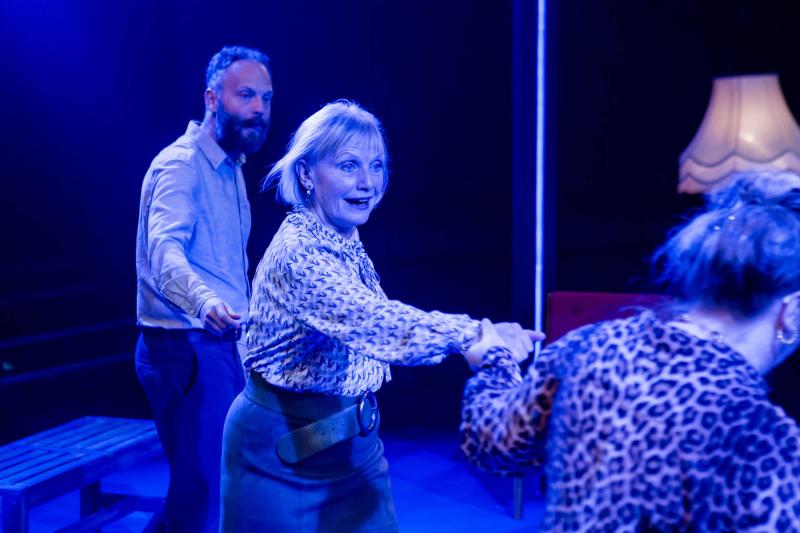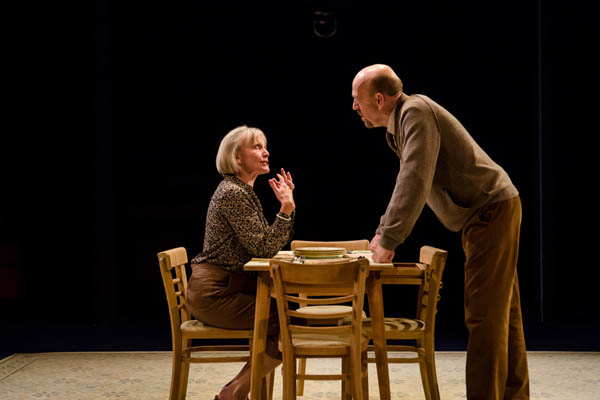Blue Heart, Orange Tree Theatre | reviews, news & interviews
Blue Heart, Orange Tree Theatre
Blue Heart, Orange Tree Theatre
Revival of Caryl Churchill’s double bill is emotionally true and theatrically thrilling

Q: How do you review a show that includes lines that ask “can my mouth swallow my mouth”? A: With difficulty, but I should be okay as long as I resist the temptation of being as surreal as Caryl Churchill is in this double bill of two short, but related one-act plays that were first staged in 1997.
In Heart’s Desire, a family wait for the return of their daughter, and their anxiety and expectation are reflected in a piece that stops and starts over and over again, beginning with repeated dialogue each time, but developing in ever more amazing (and I mean amazingly unpredictable) ways. While this playlet focuses on a father and a daughter, Blue Kettle looks at mothers and sons. In it, a middle-aged man attempts to make money by fooling elderly women into thinking that he is their long-lost son. In both cases, the family is shown to be problematic, and language struggles to express our deepest feelings.
Churchill has a tenderness towards old age, its foibles and vulnerabilities
In Heart’s Desire, Brian and Alice are in their kitchen with Maisie, Brian’s sister, waiting for Susy, their grown-up daughter, to return from Australia. Alice sets the table, Maisie fidgets and Brian comes in, pulling on a sweater. He says, “She’s taking her time”, and Alice responds, “Not really.” This exchange is then replayed, with additions and variations, as for example when Maisie gives an account of Australian fauna, Alice suddenly decides to leave, someone calls about an accident, Maisie falls over, Brian insists on going to meet Susy, Brian and Alice bicker, Maisie sings and the body in the garden (whaaat?) causes guilt. And so on. Some variations involve speeding up the dialogue, some use only fragments of the lines. Most are hilarious.
By contrast, Blue Kettle is a much more sombre affair. Here 40-year-old Derek visits a series of elderly women, who gave up their illegitimate babies for adoption 40 years earlier, and tells them that he is their biological son. Despite the passage of time, they want to believe him. But his girlfriend Enid has doubts about the morality of this con-trick. As these scenarios develop, and Derek arranges meetings that become more and more dangerous, the words “blue” and “kettle” begin to intrude into the dialogue, which finally collapses into bleak variations on these two words.
Neither playlet is quite what it seems: in both, the theatrical form is blown apart by the emotional content of the story. In the first, the tone is shot through with anxiety, apprehension and alarm. The imminent arrival of a beloved daughter brings out the worst in the tense parents, who squabble and fret. They imagine terrible events, and strange things invade their home. Another child, the grown-up Lewis, has a drink problem, and his presence, however funny, complicates some of the variations. Churchill has a real tenderness towards old age, its foibles and vulnerabilities, while at the same time being merciless about the tensions that most families incubate.
 In the second, the tone is unmistakably cruel. Derek is playing a game of deceit that might be just a hobby, or maybe he hopes will bring him financial reward, but he only succeeds in hurting people. As language collapses under the strain of deception, he seems to become more and more isolated. At the same time, the uncovering of the past mistakes of these four older women stretches our imaginations back into the past, when unmarried pregnancy was shameful, a reminder that the position of women has changed a lot over the past half century.
In the second, the tone is unmistakably cruel. Derek is playing a game of deceit that might be just a hobby, or maybe he hopes will bring him financial reward, but he only succeeds in hurting people. As language collapses under the strain of deception, he seems to become more and more isolated. At the same time, the uncovering of the past mistakes of these four older women stretches our imaginations back into the past, when unmarried pregnancy was shameful, a reminder that the position of women has changed a lot over the past half century.
All this and more is brought out in David Mercatali’s precise and exciting revival, an Orange Tree co-production with Bristol’s Tobacco Factory Theatres. On Angela Davis’s minimalist set, his cast rise to the challenge of a fiendishly difficult text, whose rapid reversals and sudden changes of pace must be a monster to learn. Andy De La Tour (pictured above) is a convincingly angry Brian whose cannibalistic monologue is a tour de force (no pun intended), while Amelda Brown’s sensible Alice (pictured with De La Tour, above) and Amanda Boxer’s scatty Maisie are perfect foils. In the second half of the 95-minute double bill, Alex Beckett’s malicious Derek dominates the women in his life. Together with the other cast members they make this an event that is both playful and genre-busting, excruciating and exhilarating, alarming and truthful.
rating
Explore topics
Share this article
The future of Arts Journalism
You can stop theartsdesk.com closing!
We urgently need financing to survive. Our fundraising drive has thus far raised £49,000 but we need to reach £100,000 or we will be forced to close. Please contribute here: https://gofund.me/c3f6033d
And if you can forward this information to anyone who might assist, we’d be grateful.

Subscribe to theartsdesk.com
Thank you for continuing to read our work on theartsdesk.com. For unlimited access to every article in its entirety, including our archive of more than 15,000 pieces, we're asking for £5 per month or £40 per year. We feel it's a very good deal, and hope you do too.
To take a subscription now simply click here.
And if you're looking for that extra gift for a friend or family member, why not treat them to a theartsdesk.com gift subscription?
more Theatre
 Faustus in Africa!, Edinburgh International Festival 2025 review - deeply flawed
Bringing the Faust legend to comment on colonialism produces bewildering results
Faustus in Africa!, Edinburgh International Festival 2025 review - deeply flawed
Bringing the Faust legend to comment on colonialism produces bewildering results
 Edinburgh Fringe 2025 reviews: Imprints / Courier
A slippery show about memory and a rug-pulling Deliveroo comedy in the latest from the Edinburgh Fringe
Edinburgh Fringe 2025 reviews: Imprints / Courier
A slippery show about memory and a rug-pulling Deliveroo comedy in the latest from the Edinburgh Fringe
 Edinburgh Fringe 2025 reviews: The Ode Islands / Delusions and Grandeur / Shame Show
Experimental digital performance art, classical insights and gay shame in three strong Fringe shows
Edinburgh Fringe 2025 reviews: The Ode Islands / Delusions and Grandeur / Shame Show
Experimental digital performance art, classical insights and gay shame in three strong Fringe shows
 Edinburgh Fringe 2025 reviews: Ordinary Decent Criminal / Insiders
Two dramas on prison life offer contrasting perspectives but a similar sense of compassion
Edinburgh Fringe 2025 reviews: Ordinary Decent Criminal / Insiders
Two dramas on prison life offer contrasting perspectives but a similar sense of compassion
 Edinburgh Fringe 2025 reviews: Kinder / Shunga Alert / Clean Your Plate!
From drag to Japanese erotica via a French cookery show, three of the Fringe's more unusual offerings
Edinburgh Fringe 2025 reviews: Kinder / Shunga Alert / Clean Your Plate!
From drag to Japanese erotica via a French cookery show, three of the Fringe's more unusual offerings
 The Two Gentlemen of Verona, RSC, Stratford review - not quite the intended gateway drug to Shakespeare
Shakespeare trying out lots of ideas that were to bear fruit in the future
The Two Gentlemen of Verona, RSC, Stratford review - not quite the intended gateway drug to Shakespeare
Shakespeare trying out lots of ideas that were to bear fruit in the future
 Edinburgh Fringe 2025 reviews: The Horse of Jenin / Nowhere
Two powerful shows consider the Israeli-Palestinian conflict, with mixed results
Edinburgh Fringe 2025 reviews: The Horse of Jenin / Nowhere
Two powerful shows consider the Israeli-Palestinian conflict, with mixed results
 Edinburgh Fringe 2025 reviews: The Fit Prince / Undersigned
A joyful gay romance and an intimate one-to-one encounter in two strong Fringe shows
Edinburgh Fringe 2025 reviews: The Fit Prince / Undersigned
A joyful gay romance and an intimate one-to-one encounter in two strong Fringe shows
 Tom at the Farm, Edinburgh Fringe 2025 review - desire and disgust
A visually stunning stage re-adaptation of a recent gay classic plunges the audience into blood and earth
Tom at the Farm, Edinburgh Fringe 2025 review - desire and disgust
A visually stunning stage re-adaptation of a recent gay classic plunges the audience into blood and earth
 Works and Days, Edinburgh International Festival 2025 review - jaw-dropping theatrical ambition
Nothing less than the history of human civilisation is the theme of FC Bergman's visually stunning show
Works and Days, Edinburgh International Festival 2025 review - jaw-dropping theatrical ambition
Nothing less than the history of human civilisation is the theme of FC Bergman's visually stunning show
 Every Brilliant Thing, @sohoplace review - return of the comedy about suicide that lifts the spirits
Lenny Henry is the ideal ringmaster for this exercise in audience participation
Every Brilliant Thing, @sohoplace review - return of the comedy about suicide that lifts the spirits
Lenny Henry is the ideal ringmaster for this exercise in audience participation
 Edinburgh Fringe 2025 reviews: The Beautiful Future is Coming / She's Behind You
A deft, epoch-straddling climate six-hander and a celebration (and take-down) of the pantomime dame at the Traverse Theatre
Edinburgh Fringe 2025 reviews: The Beautiful Future is Coming / She's Behind You
A deft, epoch-straddling climate six-hander and a celebration (and take-down) of the pantomime dame at the Traverse Theatre

Add comment